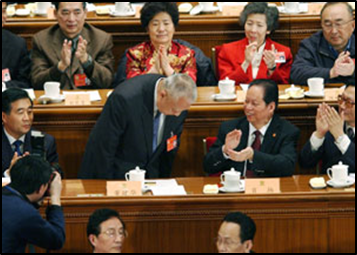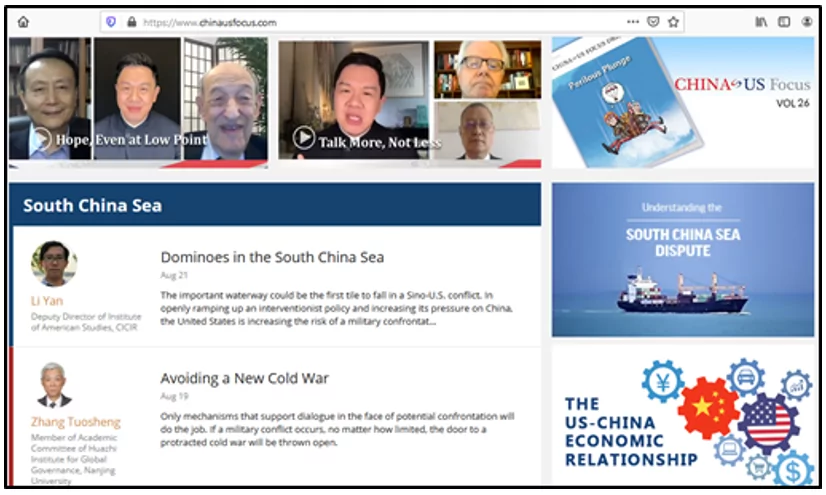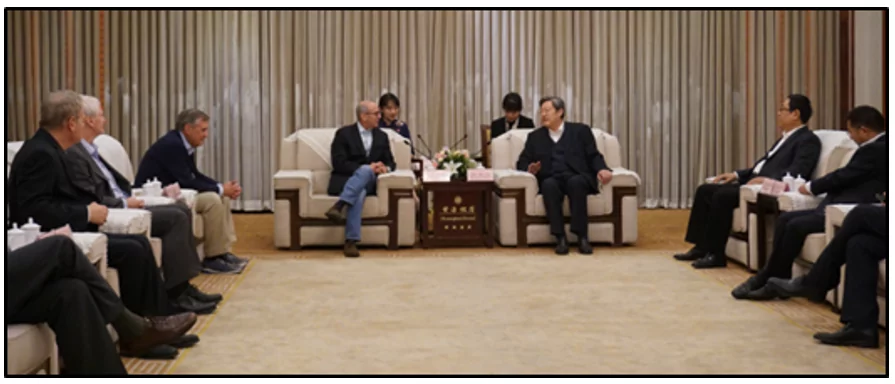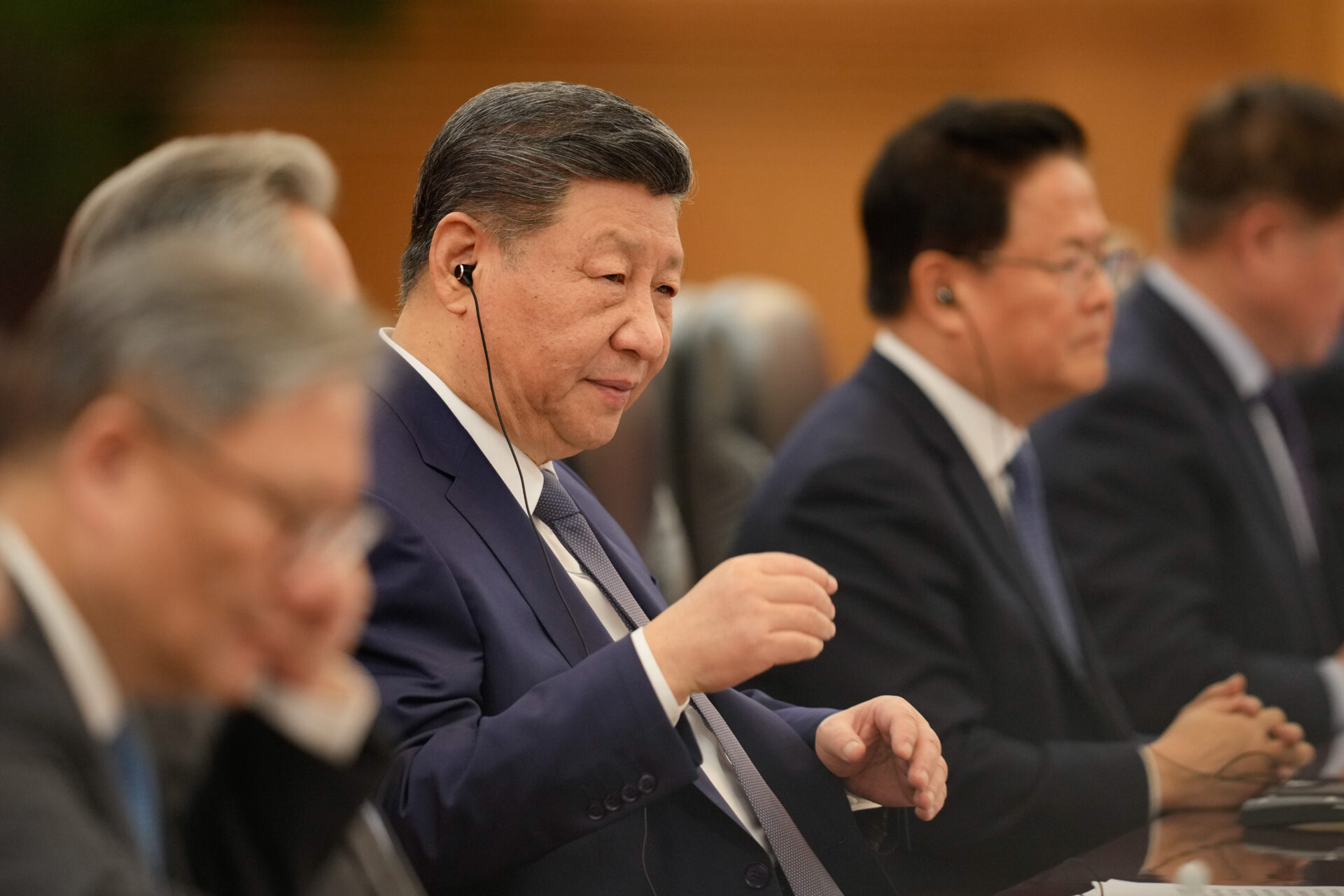
The China-U.S. Exchange Foundation and United Front “Lobbying Laundering” in American Politics
The China-U.S. Exchange Foundation and United Front “Lobbying Laundering” in American Politics
Introduction
The China-U.S. Exchange Foundation (中美交流基金会, Zhong-Mei Jiaoliu Jijinhui) (CUSEF), a nominally private civic organization founded in Hong Kong in 2008, first emerged in early 2018 as a subject of public debate in the United States. At that time, controversies emerged over grants made by CUSEF to U.S. universities, to include an endowed professorship in China studies at the Johns-Hopkins School for Advanced International Studies; and a proposed grant (which was ultimately declined) for the China Public Policy Center within the University of Texas at Austin. Critics at the time alleged that CUSEF was a component of the People’s Republic of China (PRC)’s broader network of organizations for “united front work” influence efforts (China Brief, May 9, 2019). [1] [2]
CUSEF is indeed a major player in the Chinese Communist Party (CCP)’s organizational apparatus for conducting united front work in the United States, the evidence for which will be discussed in further detail below. Furthermore, CUSEF’s controversial funding for U.S. research and academic institutions is only the tip of the iceberg in a much larger, multi-faceted effort to exert influence over U.S. policy. Arguably one of the most impactful—and least noted—lines of effort is CUSEF’s behind-the-scenes role as a sponsor of lobbying activities directed at the U.S. Congress, elite opinion, and state and local officials.
CUSEF as a Communist Party Front Organization
CUSEF officials have consistently denied connections to the People’s Republic of China (PRC) government and its united front system, and emphasized the foundation’s independent status. CUSEF describes itself as a “privately funded” and “independent, non-profit and non-governmental foundation… [that] builds platforms to encourage constructive dialogue and diverse exchanges between the people of the U.S. and China” (CUSEF, undated). In a letter to the Washington Post in 2018, CUSEF Executive Director Alan Wong asserted that the foundation “is supported by private donations,” and that it supports “programs [that] aim to provide a bridge for the people of the United States and China to engage, exchange and, more important, promote mutual understanding regarding the world’s most important bilateral relationship” (Washington Post, January 22, 2018).
Despite such assertions, CUSEF’s ties to the CCP United Front Work Department (UFWD)—and to the CCP’s united front system more generally—are hiding in plain sight. CUSEF Chairman Tung Chee-Hwa (董建華) is a former Chief Executive of Hong Kong, and a current Vice-Chairman of the Chinese People’s Political Consultative Conference (中国人民政治协商会议, Zhongguo Renmin Zhengzhi Xieshang Huiyi), or CPPCC (CUSEF, undated). The CPPCC, “a patriotic united front organization of the Chinese people, under the leadership of the Chinese Communist Party” (CPPCC, May 11, 2011), is the most prominent bureaucratic entity controlled by the UFWD. The CPPCC is used as a stage-managed “consultative” institution intended to lend a veneer of pluralism to the CCP’s system of one-party rule, as well as serving as a forum for promoting prioritized CCP propaganda themes (China Brief, April 9, 2019; China Brief, May 29).
The membership of the CUSEF board of governors is filled with other persons in the CCP’s Hong Kong united front infrastructure, to include those who hold (or have held in the recent past) positions in the PRC state or CPPCC apparatus. [3] To cite but one example, Liu Changle (刘长乐) spent his early career in the PRC’s military media and propaganda system, and in 1996 founded Phoenix Television as a satellite news channel in Hong Kong. Phoenix is partially owned by the PRC state broadcaster CCTV, and is known for its reliably pro-CCP coverage. [4] Liu serves as a standing committee member of the current 13th National Committee of the CPPCC, and was also a member of the previous 10th, 11th, and 12th CPPCCs (CUSEF, undated).
CUSEF-Funded Lobbying and Propaganda Activities in the United States
Over the past decade, CUSEF has been one of the most prominent Chinese entities funding lobbying efforts in the United States: from 2010 to the present, at least seven U.S. firms have maintained contracts with CUSEF for lobbying and public relations services. Lobbying registration documents filed by these firms commonly identify their client as “an independent, non-profit and non-governmental foundation,” and generally describe their lobbying activities in vague terms of efforts to improve U.S.-China relations. However, in some instances greater detail is available. Summaries of these lobbying relationships, based on legally-mandated disclosure documents, follow below. [5]
BLJ Worldwide
The U.S.-based public relations firm BLJ Worldwide (originally Brown Llyod James) entered into a business relationship with CUSEF in January 2010. The firm agreed to perform “a broad range of public services in the U.S., including but not limited to defending and promoting China and the key strategic areas in the China-U.S. relationship in the media,” for which it was to receive $20,000 per month plus expenses. [6] BLJ Worldwide’s relationship with CUSEF continues to the present, and has grown in value over time. (In 2017, the firm also commenced more direct representation of the PRC by taking on the PRC Embassy as a client.) In the first six months of 2020, the firm collected $313,200 from CUSEF (in addition to $144,000 from the PRC Embassy) for “help[ing] CUSEF to engage openly with academic and thought leaders,” and “provid[ing] support for delegations visiting China,” as well as supporting trips to China for U.S.-based media outlets. Services also included “support [for] the ChinaUSFocus.com website and related social media accounts.” [7]
| Public Relations Firms and Manufactured Think Tank Publications
The China-US Focus website, and affiliated social media accounts (such as Twitter), provide an illuminating example of PRC-sponsored efforts to shape opinion on the internet. Created in 2011, China-US Focus is an on-line publication that presents itself as “one of the leading commentary journals of China-U.S. relations” (China-US Focus, undated), and as an independent outlet for both Chinese and international authors to “shar[e] opinions and thoughts on the most important bilateral relationship of the 21st century” (China-US Focus, undated). However, the website’s sponsorship by CUSEF, and its management by a public relations firm, reveal the project’s true purpose as a propaganda vehicle (see accompanying image). This practice—of using a public relations firm to manage a synthetic think tank publication, which in turn publishes material that aligns with PRC propaganda narratives—matches a pattern seen elsewhere in the world, as with the Sinoskop website launched in the Czech Republic in 2019 (China Brief, January 17). |

Fontheim International LLC
Fontheim International LLC began work for CUSEF in 2009, intending to perform lobbying services on “All aspects of [the] China/US relationship including: climate change, clean technology, global economy, [and] national security.” The firm’s quarterly revenues from CUSEF have shifted over time, ranging from $30,000 to a high of $120,000 (in 2nd quarter 2015). In 2018, the firm collected a total of $150,000 for lobbying and organizational work in support of “Exchange programs between American and Chinese academics, state/provincial and local officials, and others” and “US-China dialogue programs.” The relationship continued through apparent termination at the end of February 2019. [8]
Covington & Burling LLP
Covington & Burling LLP commenced lobbying for CUSEF in late 2012, reporting $30,000 in revenue for lobbying House and Senate offices in support of “United States-China relations.” Services continued into 2014; in that year, the firm collected $110,000 before the relationship was terminated in November 2014. [9] The primary lobbyist identified in these efforts was Martin Gold, and the CUSEF account apparently followed him to Capitol Counsel LLC, commencing in December 2014 (see below).

Capitol Counsel LLC
Capitol Counsel LLC commenced representation for CUSEF in December 2014. Per terms of the initial contract, the firm received $10,000 per month, plus expenses; in 2017 this increased to $15,000 per month plus expenses. The firm’s promised services for CUSEF have included: “policy and political intelligence gathering and analysis on China issues;” “substantive advice on China-related legislation;” “arranging meetings and programs on Capitol Hill;” “dissemination within Congress of materials generated or sponsored by CUSEF;” “organization of and participation in CUSEF’s former Members of Congress activities;” and “coalition building with the U.S. Association of Former Members of Congress.” [10] A significant component of Capitol Counsel’s work for CUSEF has been the cultivation of current and former members of Congress, and facilitating meetings and travel for delegations of such persons to China (see accompanying image). [11]
The Podesta Group
The Podesta Group, once known as one of Washington’s most influential lobbying firms, registered in March 2015 to perform services for CUSEF. In its disclosures, the firm indicated only that it intended to lobby offices in both houses of Congress in support of “China-U.S. relations.” In 2017, its last year of operation, the firm billed a total of $290,000 for its services on behalf of CUSEF ($80,000 each quarter, except for $50,000 in quarter four). The relationship terminated in November 2017 when the firm went out of business (Politico, November 10, 2017). [12]
| Lobbying and “Track Two” Dialogues
Exchange trips organized during this period demonstrate how lobbying efforts may intersect with seemingly innocuous “track two” dialogue activities. In 2015 and 2016, CUSEF sponsored trips to China by delegations from the Center for American Progress, a Washington, D.C.-based think tank founded by Podesta Group co-founder John Podesta. The ostensible purpose of the trips was to discuss U.S.-China cooperation on matters of common concern, such as regional security and global climate change. The 2016 trip, for example, offered the opportunity for meetings with PRC officials to include Zhang Gaoli (张高丽), then-PRC Vice Premier and a member of the CCP Politburo Standing Committee; Jin Liqun (金立群), President of the Asian Infrastructure Investment Bank; and Admiral Sun Jianguo (孙建国), Deputy Chief of the PLA Joint Staff Department (CUSEF, undated). The examples of the Capitol Counsel and CAP exchange trips, organized with CUSEF sponsorship, illustrate how nominal track two dialogues may be compromised by lobbying relationships; and how, in certain instances, such dialogues may themselves be a function of lobbying activity. Although an overlap between lobbying and exchange activities does not necessarily negate all potential benefits of such dialogues, it does draw into question the objectivity of some participants—as well as the extent to which others involved may or may not be aware of the motivations of the trip’s sponsors. It also brings into question the extent to which such exchanges may be employed by the PRC for targeted influence and propaganda efforts, as well as to “evaluate the participants for their [potential] future usefulness.” [13] |

Wilson Global Communications
Wilson Global Communications took on CUSEF as a client in January 2017, indicating that it would “provide communications and public relations services, as well as government relations, including outreach to U.S. public officials and relevant private sector organizations… includ[ing] efforts to build and improve dialogue between China and African American business, education, and civic leaders, and to improve relations between China and the U.S. in general.” Additionally, the firm’s website indicates that, on behalf of “the Hong-Kong based nonprofit organization, the China-United States Exchange Foundation… Wilson has built and enhanced relationships on Capitol Hill with members of the U.S. House of Representatives” (Wilson Global Communications, undated). The firm has also performed outreach on behalf of CUSEF to state and local government officials in Texas. For its services, the firm initially billed $13,000 per month plus expenses, increased to $15,000 per month in 2020. [14]
BGR Government Affairs
The most recent addition to CUSEF’s list of representatives is BGR Government Affairs, which accepted the foundation as a client in February 2019. The firm describes itself as “Washington’s premier, bipartisan lobbying firm,” which offers an “international affairs practice to help clients influence decision-makers in political and financial capitals across the world,” to include an office in Beijing (BGR, undated). Per BGR’s registration, its work for CUSEF “will include strategic guidance and counsel with regard to government affairs activity… This may include relevant outreach to U.S. government officials, non-governmental organizations, [and] members of the media,” and “contact as necessary with members of Congress and their staff and executive branch officials.” For its services, the firm receives an annual fee of $400,000 plus expenses. [15]
Conclusion
The identity of the China-U.S. Exchange Foundation—that of a nominally private entity, which in actuality functions as a de facto front organization for the PRC government—allows it to play a valuable role in Beijing’s efforts to sway public opinion and build influence in America. CUSEF’s extensive contracts with U.S. lobbying and public relations firms—contracts involving both sums and a breadth of activities difficult to reconcile with those of a genuine non-profit civic foundation—represent a sort of “lobbying laundering,” in which a nominally independent third-party organization acts as a primary agent for funding and managing lobbying efforts on behalf of the PRC. Coming to a fuller understanding of these disguised and well-funded efforts to sway both elite opinion and U.S. government policy will be a vital component of coming to grips with the CCP’s broader influence efforts directed at the United States, as well as the wider world.
John Dotson is the editor of China Brief. For any comments, queries, or submissions, feel free to reach out to him at: cbeditor@jamestown.org.
Notes
[1] For a general discussion of the controversies surrounding CUSEF funding for SAIS and UT-Austin, see: Elizabeth Redden, “Thanks, But No Thanks,” Inside Higher Ed (January 16, 2018), https://www.insidehighered.com/news/2018/01/16/ut-austin-rejects-funding-chinese-government-linked-foundation. For background on the role played by Tung Chee-Hwa and CUSEF in funding institutions in the United States, see: Bethany-Allen Ebrahimian, “This Beijing-Linked Billionaire Is Funding Policy Research at Washington’s Most Influential Institutions,” Foreign Policy (November 28, 2017), https://foreignpolicy.com/2017/11/28/this-beijing-linked-billionaire-is-funding-policy-research-at-washingtons-most-influential-institutions-china-dc/.
[2] Among critics speaking out at the time was U.S. Senator Ted Cruz, who stated in a letter to UT-Austin administrators that “I am deeply concerned that collaborating with CUSEF, given its affiliation with the People’s Republic of China’s (PRC) united front system and its registration as an agent of a foreign principal, would disseminate PRC propaganda within the Center and compromise its credibility.” (See: letter from U.S. Senator Ted Cruz to UT-Austin President Greg Fenves, Jan. 2, 2018. https://www.washingtonpost.com/r/2010-2019/WashingtonPost/2018/01/14/Editorial-Opinion/Graphics/2018.01.02LetterToUTOnCUSEF.pdf?tid=a_mcntx)
[3] A partial list of examples would include: Elsie Oi Sie Leung, an attorney who serves as the current deputy director of the Hong Kong Basic Law Committee in the Standing Committee of the PRC National People’s Congress (CUSEF, undated); Payson Cha Mou Sing, a businessman who served as a member of the National Committee of the CPPCC from 1993 to 2013 (CUSEF, undated); and Martin Lee Ka Shing, a property developer who serves as a current member of the Beijing CPPCC Committee (CUSEF, undated).
[4] Anne-Marie Brady, Marketing Dictatorship: Propaganda and Thought Work in Contemporary China (Rowman & Littlefield, 2008), p. 160; and Philip P. Pan, “Making Waves, Carefully, on the Air in China,” Washington Post, Sep. 19, 2005,
https://www.washingtonpost.com/wp-dyn/content/article/2005/09/18/AR2005091801597.html.
[5] Unless otherwise noted, referenced disclosure documents were obtained from the Foreign Agents Registration Act (FARA) database maintained by the U.S. Department of Justice (https://www.justice.gov/nsd-fara); the lobbying disclosure database of the Clerk of the U.S. House of Representatives (“House”) (https://disclosurespreview.house.gov); and/or the lobbying disclosure database of the Secretary of the U.S. Senate (“Senate”) (https://www.senate.gov/legislative/Public_Disclosure/LDA_reports.htm).
[6] FARA registration document (Aug. 3, 2010), https://efile.fara.gov/docs/5875-Exhibit-AB-20100803-10.pdf.
[7] FARA registration document (Aug. 31, 2020), https://efile.fara.gov/docs/5875-Supplemental-Statement-20200831-31.pdf.
[8] Fontheim International LLC. For initial registration and 2015 revenues, see: Senate database registration document (Aug. 10, 2009), https://soprweb.senate.gov/index.cfm?event=getFilingDetails&filingID=F802865F-44C9-4FF7-AAB6-BC229FCE018F&filingTypeID=1; and Senate database disclosure document (July 15, 2015), https://soprweb.senate.gov/index.cfm?event=getFilingDetails&filingID=2A93B32D-4F2F-4A5F-AC87-E0D466AB8392&filingTypeID=60. For Fontheim International LLC 2018 quarterly lobbying disclosures in the House lobbying database, see: quarter one (April 12, 2018), https://disclosurespreview.house.gov/ld/ldxmlrelease/2018/Q1/300944358.xml; quarter two (July 6, 2018), https://disclosurespreview.house.gov/ld/ldxmlrelease/2018/Q2/300962664.xml; quarter three (Oct. 22, 2018), https://disclosurespreview.house.gov/ld/ldxmlrelease/2018/Q3/300997687.xml; quarter four (Jan. 18, 2019), https://disclosurespreview.house.gov/ld/ldxmlrelease/2018/Q4/301009645.xml. For the termination report, see: House database termination report (Feb. 28, 2019), https://disclosurespreview.house.gov/ld/ldxmlrelease/2019/1T/301035674.xml.
[9] Covington & Burling LLP. For registration, see: House lobbying database (Jan. 18, 2013), https://disclosurespreview.house.gov/ld/ldxmlrelease/2012/Q4/300535490.xml. For 2014 quarterly disclosures, see: quarter one (April 17, 2014), https://disclosurespreview.house.gov/ld/ldxmlrelease/2014/Q1/300639625.xml; quarter two (July 18, 2014), https://disclosurespreview.house.gov/ld/ldxmlrelease/2014/Q2/300662815.xml; quarter three (Oct. 20, 2014), https://disclosurespreview.house.gov/ld/ldxmlrelease/2014/Q3/300685005.xml; quarter four (Jan. 16, 2015), https://disclosurespreview.house.gov/ld/ldxmlrelease/2014/4T/300698480.xml.
[10] Capitol Counsel LLC. For registration, see: FARA registration document (Nov. 19, 2018), https://efile.fara.gov/docs/6328-Exhibit-AB-20181119-6.pdf. For terms of initial agreement, see: FARA disclosure document (Dec. 10, 2018) (Capitol Counsel letter dated Dec. 15, 2014), https://efile.fara.gov/docs/6328-Exhibit-AB-20181210-7.pdf. For 2019 business terms, see: FARA disclosure document (dated Jan. 15, 2019), https://efile.fara.gov/docs/6328-Exhibit-AB-20190115-8.pdf.
[11] In addition to services for CUSEF, Capitol Counsel LLC also serves as a consultant to the U.S.-China Transpacific Foundation, a Las Vegas-based entity funded by the Chinese government that operates a travel program “intended to provide the Members of Congress and/or the congressional staff the opportunity to enhance their understanding on the cultural, economic, political and social developments of the People’s Republic of China, thus helping strengthen China-U.S. relations.” For its services, Capitol Counsel charged an “initial fee of $50,000” in September 2017 (FARA registration document dated Sep. 15, 2017, https://efile.fara.gov/docs/6328-Exhibit-AB-20170915-4.pdf); in the period Feb. 2019 to January 2020, the firm collected fees of $10,000 per month (FARA disclosure dated March 20, 2019, https://efile.fara.gov/docs/6328-Exhibit-AB-20190320-10.pdf).
[12] The Podesta Group. For initial registration, see: House lobbying document (March 2, 2015), https://disclosurespreview.house.gov/ld/ldxmlrelease/2015/RR/300717876.xml. For 2017 disclosures, see: quarter one (April 20, 2017),https://disclosurespreview.house.gov/ld/ldxmlrelease/2017/Q1/300874634.xml; quarter two (July 20, 2017), https://disclosurespreview.house.gov/ld/ldxmlrelease/2017/Q2/300894027.xml; quarter three (Oct. 20, 2017), https://disclosurespreview.house.gov/ld/ldxmlrelease/2017/Q3/300913143.xml; quarter four (Dec. 15, 2017), https://disclosurespreview.house.gov/ld/ldxmlrelease/2017/4T/300920380.xml.
[13] Peter Mattis, written testimony for “China’s Growing Influence in Asia and the United States,” hearing held by the U.S. House of Representatives Foreign Affairs Committee Subcommittee on Asia, the Pacific, and Nonproliferation (May 8, 2019), p. 12. https://docs.house.gov/meetings/FA/FA05/20190508/109458/HHRG-116-FA05-Wstate-MattisP-20190508.pd.[14] Wilson Global Communications. For initial registration, information on contacts with the U.S. House of Representatives and officials in Texas, and initial fees, see: FARA registration document (Aug. 31, 2018), https://efile.fara.gov/docs/6584-Exhibit-AB-20180831-7.pdf. For further information, see FARA disclosure document (Nov. 5, 2018), https://efile.fara.gov/docs/6584-Exhibit-AB-20181105-8.pdf; and FARA disclosre document (Feb. 1, 2019), https://efile.fara.gov/docs/6584-Exhibit-AB-20190201-9.pdf.
[15] BGR Government Affairs. For registration, services to be performed, and fees, see: FARA registration document (March 1, 2019), https://efile.fara.gov/docs/5430-Exhibit-AB-20190301-72.pdf.


